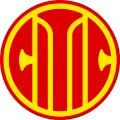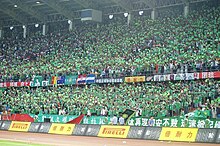|
Beijing Guoan F.C.
Beijing Guoan Football Club (Chinese: 北京国安足球俱乐部; pinyin: Běijīng Guó'ān Zúqiú Jùlèbù), known internationally as Beijing FC,[3] is a Chinese professional football club based in Beijing, that competes in the Chinese Super League, the top tier of Chinese football. Beijing Guoan plays its home matches at the Workers' Stadium, located within Chaoyang District. In early 2021, the shareholders changed from the real estate company Sinobo Group (64%) and CITIC Limited (36%) of CITIC Group to just Sinobo Group (100%).[4] Beijing Guoan is one of the four clubs to have never been relegated from the Chinese top-flight since the Chinese Super League's foundation in 2004. The club's predecessor was called Beijing Football Club and they predominantly played in the top tier, where they won several domestic league and cup titles. On 29 December 1992,[5] the club was recognized to become a completely professional football club, making them one of the founding members of the first fully professional top-tier league in China. Since then, they have gone on to win their first ever professional league title in the 2009 league season as well as the 1996, 1997, 2003, and 2018 Chinese FA Cup. According to Forbes, Guoan was the second most valuable football team in China, with a team value of US$167 million, and an estimated revenue of US$30 million in 2015.[6] According to the disclosure of CITIC Pacific, the club revenue was CN¥244 million in the 2013 season.[7] In the 2015 season, the sponsorship from CITIC Securities was CN¥25 million.[8] History
1950s–1992: Early club era The club's first incarnation came in 1951 when the local government sports body decided to take part in China's first fully nationalized national football league tournament.[9] To prepare for the competition they participated in the 1951 North China Football Competition where they officially unveiled the team for the first time on 28 October 1951.[10] After this tournament the relevant parties decided to form a football team with the best players from Beijing and Tianjin to create the North China team who were unveiled on 1 December 1951 for the start of the national football league tournament.[11][12] The team name was taken from the football team in the 1910 multi-sport event Chinese National Games that also represented the same regions.[13] The team ended up finishing fourth in their debut season and with the football league gradually expanding, the players from Beijing and Tianjin were allowed to separate and the local Beijing government sports body was allowed to reform the club as Beijing Football Club in 1955. The club made its debut appearance in the 1956 season and wore an all-white home kit and all-red away strip.[14] In the 1956 campaign, the club was also allowed to enter their youth team called Beijing Youth B, who actually went on to win the league title while Beijing came sixth that season.[15] The club strengthened their hold on the following seasons when they won the 1957 and 1958 league titles.[16] With these results, the club had become a major force within Chinese football, and with the club's youth team still participating within the top tier, there was a constant supply of players coming into the team to fight for places. Being China's capital city and for their success on the field, the club had become a feeder team for the Chinese national team. This often saw the club unable to complete a full championship schedule and the youth team were often used to represent the club, which did little to diminish Beijing football and actually resulted in the youth team winning the 1963 championship for the second time, showing the strength in depth of the region of Beijing football until 1966, when the Chinese Cultural Revolution halted football within the country.[17] When football returned to China, Beijing won the 1973 league title in the newly re-established footballing league.[18] While Beijing once again re-established themselves as major title contenders, they did not win any major titles until 1982, where they won the league title, followed by the 1984 league title and the 1985 Chinese FA Cup title. After this period, Beijing's performances seemed to have declined and were relegated for the first time in their history to the second tier at the end of the 1988 season. However, their time within the second tier was short-lived and they won the division title and promotion to the first tier at the end of the 1990 season.[19] In total, Beijing had won the league title five times during the old Chinese National Football League era before the club was given full professionalism in 1992.[20] 1992–1999: Professionalism Beijing Guoan was formed on 29 December 1992, as a result of the Chinese football reform, which was the Chinese Football Association's attempt to professionalize the Chinese football league system. The club was set up by CITIC Guoan of CITIC Group, a state-owned enterprise of China, and the Beijing Municipal Sports Committee.[21][22] The club then took part in the 1994 Chinese Jia-A League season, making them a founding member of the first fully professional top-tier league in China and changed their home colors to green to symbolize the change.[14] In their first professional season, Beijing finished in a disappointing eighth out of twelve teams and club manager Tang Pengju was relieved of his duties.[23] The club brought in Jin Zhiyang to manage them the following season and the results under his reign improved enough for them to finish the 1995 campaign in the runner-up position.[24] The following season, Jin Zhiyang lead Beijing to their first professional trophy when they beat Jinan Taishan Jiangjun 4–1 to win the 1996 Chinese FA Cup.[25] Jin Zhiyang was able to retain the Cup the following year with a 2–1 victory against Shanghai Shenhua, which impressed the Chinese FA, who lured him away from Beijing when they offered him a position with the Chinese national team.[26] Assistant coach Shen Xiangfu stepped into the managerial role and in his debut season, he guided the club to third within the league. However, in his second season the team slid down to sixth and he left the club.[27] 2000–2009: Foreign influences  Serbian Milovan Đorić became Beijing's first foray with a foreign manager when he joined the club at the start of the 2000 league season. His reign was exceptionally short-lived after he lost his first three games of the season before he was replaced with native coach Wei Kexing.[28] At the start of the 2002 league season, Beijing hired their second foreign manager in Ljupko Petrović.[29] Foreign influences continued in 2003, when the club signed a three-year endorsement contract with jointly-owned South Korean company Beijing Hyundai, which resulted in the club changing its name to Beijing Hyundai to accommodate this.[30] In 2005, Spanish football club Real Madrid went into negotiations with Beijing on a football development project.[31] At the start of the 2007 league season, two-time Chinese FA Cup winner with Chongqing Lifan and Qingdao Beilaite, Lee Jang-soo, was hired as the team's manager. The South Korean manager, in his debut season, guided the club to second within the league. By the 2009 league season, the club had returned to the Workers Stadium (after it had been in renovation for the 2008 Summer Olympics) under Lee Jang-soo's helm. It looked as if the club would be winning its first professional league title until a 2–0 defeat from Changchun Yatai on 15 September 2009, which saw the club slip to third place and Lee Jang-soo was unscrupulously fired with seven games remaining.[32] Former Beijing player Hong Yuanshuo was immediately brought into the team and on the final day of the season, Beijing thrashed Hangzhou Greentown 4–0 to clinch the 2009 league championship.[33] 2010–2016: Challenging for the title2017–2019: Sinobo Group takeover 2020–present: Effects of COVID-19 OwnershipDespite being founded by CITIC Guoan Group, the stake of the football club was held by another subsidiary, CITIC Corp., Ltd. (Chinese: 中国中信股份有限公司) of CITIC Group, a Beijing-incorporated SPV, for a possible listing in mainland China since 2012.[34] (CITIC Group invited other investors to purchase the new shares of CITIC Guoan Group in 2014,[35] making the company no longer a subsidiary of CITIC Group). In 2014, CITIC Group floated, by backdoor listing, most of their assets to their Hong Kong-based subsidiary CITIC Pacific (renaming it to CITIC Limited), including the entire share capital of "CITIC Corp.", thus the stake of the football club was indirectly floated in a stock exchange. On 27 December 2016, real estate company Sinobo Group participated in the capital increase of the club for a reported 64% stake, which was finalised on 10 January 2017, making them the largest shareholder.[36][37] According to a Chinese Government database, the share capital of the club had increased from CN¥75 million to CN¥208.33 million, making Sinobo Group own a 64.00% stake with CN¥133.33 million par value and undisclosed share premium.[38] The club was also renamed to Beijing Sinobo Guoan F.C. Co., Ltd..[38] Name history
Stadiums Five stadiums in four sites have been used as the home ground of Beijing Guoan since 1994:
Kits  Kit suppliers and shirt sponsors
Rivalries Beijing Guoan's fiercest and oldest rivalry is against Shanghai Shenhua and is often referred to as the Jing-Hu derby, a.k.a. the rivalry between Beijing and Shanghai.[43] The rivalry with Shenhua is viewed as a manifestation of the rivalry that exists between the cities on which is the most important towards the country, as one is the center of government while the other is the financial centre of modern commerce within China.[44] With each club being able to claim an extensive history spanning successful periods, direct competition for silverware, however, rarely coincided until the 1997 league season. With Shenhua having won the 1995 league title and Beijing having won the 1996 Chinese FA Cup, both teams looked as if they had the pedigree to win silverware that season and on 20 July 1997, in a vital league game, Beijing thrashed Shenhua 9–1 at the Workers' Stadium in Beijing.[45] It was Beijing's largest victory and Shenhua's greatest defeat ever recorded. Soon after that match, both teams met again in the 1997 FA Cup final, which saw Beijing win the cup.[46] Between 2010 and 2024, Beijing Guoan holds a record of twelve straight wins over Shanghai Shenhua at the Workers' Stadium, Beijing Guoan's home ground.[47] The Jing-Jin derby is a local and long-standing rivalry between Beijing Guoan and neighboring Tianjin Jinmen Tiger.[48] Both teams can trace their histories to the North China team before it split to form the Beijing Football Club and Tianjin Football Club.[15] Since then, both clubs have predominantly remained within the top tier of Chinese football, providing a constant rivalry fixture which has led to intense matches that have spilled out away from the stadiums and onto the streets that have led to property destruction as well as further intensifying their relationship.[49] Current squadFirst team
Note: Flags indicate national team as defined under FIFA eligibility rules; some limited exceptions apply. Players may hold more than one non-FIFA nationality.
Reserve teamNote: Flags indicate national team as defined under FIFA eligibility rules; some limited exceptions apply. Players may hold more than one non-FIFA nationality.
Out on loanNote: Flags indicate national team as defined under FIFA eligibility rules; some limited exceptions apply. Players may hold more than one non-FIFA nationality.
Retired numbers12 – retired in Jan 2016 for club Supporters (the 12th Man).[51] 13 – retired for the club legend, Xu Yunlong. Senior club officials
Technical staff
Manager history
Captain history
HonoursFirst teamAll-time honours list, including semi-professional Beijing period.[20][52]
Personal honours
ResultsAll-time league rankingsAs of the end of the 2024 season.[53][54]
Key
International results
On neutral venues, the scores for Beijing F.C. are written first.
RecordsWins
Defeats
Streaks
See alsoReferences
External links
|
|||||||||||||||||||||||||||||||||||||||||||||||||||||||||||||||||||||||||||||||||||||||||||||||||||||||||||||||||||||||||||||||||||||||||||||||||||||||||||||||||||||||||||||||||||||||||||||||||||||||||||||||||||||||||||||||||||||||||||||||||||||||||||||||||||||||||||||||||||||||||||||||||||||||||||||||||||||||||||||||||||||||||||||||||||||||||||||||||||||||||||||||||||||||||||||||||||||||||||||||||||||||||||||||||||||||||||||||||||||||||||||||||||||||||||||||||||||||||||||||||||||||||||||||||||||||||||||||||||||||||||||||||||||||||||||||||||||||||||||||||||||||||||||||||||||||||||||||||||||||||||||||||||||||||||||||||||||||||||||||||||||||||||||||||||||||||||||||||||||||||||||||||||||||||||||||||||||||||||||||||||||||||||||||||||||||||||||||||||||||||||||||||||||||||||||||||||||||||||||||||||||||||||||||||||||||||||||||||||||||||||||||||||||||||||||||||||||||||||||||||||||||||||||||||||||||||||||||||||||||||||||||||||||||||||||||||||||||||||||||||||||||||||||||||||||||||||||||||||||||
